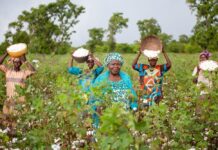The Africa Climate Summit 23 will be held Sept. 4-6 in Nairobi, Kenya. There will be discussions about how policymakers, businesses, foundations and others can help drive green growth in African countries.
All of which is absolutely necessary. But it’s also important to help families and communities outside the network of large institutions make positive changes.
One way is to start with schools.
For example, environmental clubs in many schools in Kenya learn about what drives climate change, including actions taken by members of their own communities. In many rural areas, the main environmental harm is harvesting wood for fuel from established forests. The result is deforestation that reduces CO2 absorption capacity. Nearly as important in the near term, deforestation removes protection from wind damage. Unimpeded wind can cause serious damage to homes, livestock enclosures, schools and other structures. The costs of rebuilding keep many families in poverty.
To counter this, students in school environmental clubs plant hundreds of tree seedlings near their schools. These are especially bred fast-growing trees. When fully grown, they will provide shade to help keep schools cooler and provide protection from wind.
Their branches are harvested and sold as fuel in local markets. Students generate income for their clubs and learn entrepreneurial skills. Crucially, this source of fuel reduces pressure on families to harvest wood from established forests.
Students also bring their knowledge and experience home to their families, which also plant, harvest and sell branches from fast-growing trees. These trees provide shade and protect from wind and income from them crucial extra income.
Some families have also taken the next step to plant vegetables within their “forests.” This agroforestry can provide critical sources of nutrition and enhance food security. Surplus can be sold in local markets, further improving incomes.
A similar program is underway in Tanzania. The eight school environmental clubs there are linked to the Rorya District Department of the Environment. This will help ensure their continued activities once World Neighbors, the NGO that helped set them up, ends its involvement.









[…] article originally appeared on FarmersReviewAfrica.com on August 23, […]
Comments are closed.